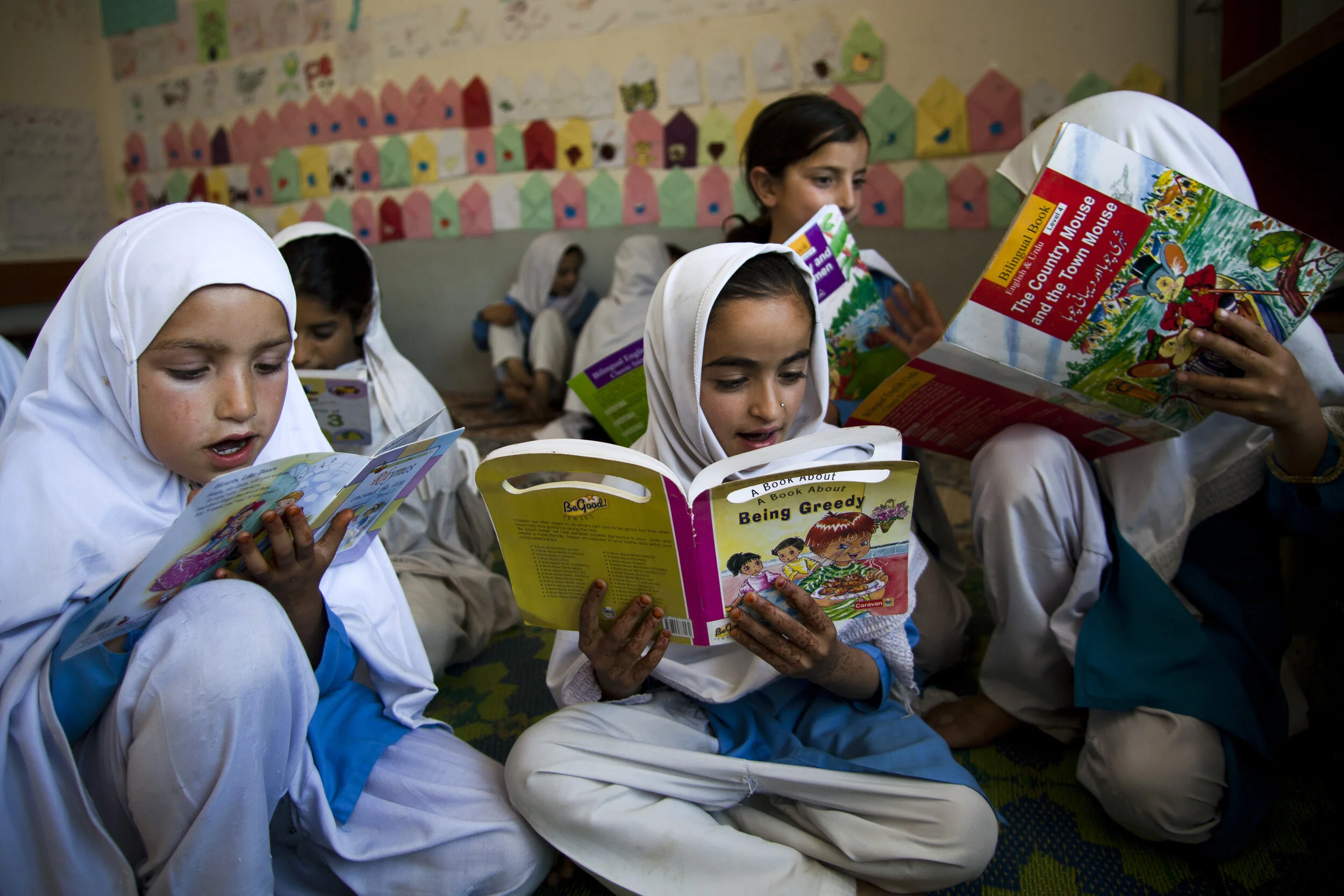A GBA Open Book Series Partner Event
Whether it is a new app supporting reading skills, a global competition to write stories, or the launch of a new book, access to literacy matters. An individual’s ability to read opens up new opportunities, new worlds, and builds self-confidence. When that individual is a girl those benefits go even further by supporting reductions in gender-based violence and early marriage, access to menstrual hygiene management, an expansion of their world into science and technology education, and so much more including the improved life chances of a literate woman’s child. Literacy helps girls reach their full potential into adulthood whatever that may be.
The launch of the Global Book Alliance’s (GBA) Open Book Partner Series took place in late May, in the lead up to the G7 Leaders’ Summit 2021. The GBA supports the G7’s commitment to girls’ education, a prominent theme of the G7 Foreign and Development Ministerial Meetings and highlighted in the Declaration on Girls’ Education. The GBA Open Book webinar—Ensuring Books for Half the Sky: Why Girls Need Books—included speakers from the UK’s Foreign, Commonwealth, and Development Office, the United States Agency for International Development (USAID), Rwanda’s Ministry of Education, and The World Bank, who engage in supporting, advocating, and ensuring change so that more girls can get access to books and a quality education. This work is core to the mission of the GBA—changing the way books are created, procured, provided, and used by strengthening the book supply chain.
The GBA Open Book Webinar’s keynote speaker Helen Grant, the UK Prime Minister’s Special Envoy for Girls’ Education, stressed that girls having access to education is core to global social development.Their ability to read and learn is future proofing - when “girls are educated, they become educated mothers and leaders”. The UK’s leadership to get 40 million more girls into school and 20 million more girls reading by the age of 10 in low and lower middle-income countries by 2026 aims to ensure that there are no more “lost generations” of girls and women due to limited literacy. In her keynote speech, Mrs. Grant talked of education programs in Ghana and Sierra Leone which are not only improving learning but addressing safeguarding issues such as violence, early pregnancy and access to self-agency tools. In Sierra Leone this has translated into a radical inclusion policy that allows girls to return to school to ensure their foundational education, access to books and the ability to read them even when pregnant.
Rwanda, a global leader in literacy gains, was represented by Dr. Valentine Uwamariya, the country’s Minister of Education, who detailed how the country has pushed for education reform through real evidence. The Ministry of Education is working to ensure that girls can stay in school, learn to advocate for themselves and pave the way to benefit future generations. Their Rwanda Vision 2050 enshrines gender equality in the constitution, including the equal right to education. The country’s National Girls’ Policy aims to ensure that girls are appropriately skilled with foundational literacy and numeracy and has led to increased school enrolment at a secondary level. Working with the Association for the Development of Education in Africa (ADEA), a GBA Steering Committee member, Rwanda is spearheading a national book policy that will set the right foundation for a strong book supply chain and ensure the sustainable provision of books for girls and includes support for teachers, parents and caregivers to help their girl learners.
In his remarks, Dr Jaime Saavedra, the Global Director of Education at the World Bank, highlighted society’s role in supporting girls’ learning opportunities. The World Bank’s “Read at Home” program aims to deliver reading, learning and play materials to hard-to-reach homes, as quickly and efficiently as possible, and encourage parents and others to support their learner’s engagement at home. A strong book supply chain has to go beyond delivering books to also ensuring that they can be utilized by the learner. World Bank Learning Poverty Indicators have shown that whilst good progress has been made in school admissions, actual learning skills whilst in school have not improved to the same level. Dr. Saavedra emphasized a global learning crisis that goes beyond access to schooling and reframes the conversation towards better support for the basics of learning. This crisis has been exacerbated by the Covid-19 pandemic with school closures and reductions in government education spending. Even with these setbacks, the data shows clearly that girls do better when they are in school.
The two final speakers spoke about their work leading education and gender programs for the UK and U.S. development agencies and the pivots they and their teams have made in light of COVID-19. LeAnna Marr, USAID Acting Deputy Assistant Administrator for the Bureau for Development, Democracy and Innovation’s Center for Education, described the Agency’s support of the GBA through book supply chain analyses as well as the Agency’s work in education across 50 countries. This work has aimed to increase low and no tech options to access literacy, including the Global Digital Library, supported by the Norwegian Agency for Development Cooperation (Norad) and other partners, a free, online library of over six thousand books and other learning materials that can be used to serve learners through multiple modalities, including digital, print and radio. Ms. Marr acknowledged that this will be an ongoing engagement given that the effects of COVID-19 will be felt for a long time, and it won’t be the last crisis to challenge gains in education access. She also noted the increased need at the country and partner level for investment in distance learning to ensure that no reader or child, regardless of gender, gets left behind.
Alicia Hebert, the Director of Education, Gender and Equality and Special Envoy on Gender Equality at the UK’s Foreign, Commonwealth, and Development Office also spoke to the need for more resilient systems built for the future. Recent work across 18 countries by the FCDO supports ongoing basic education programs while also ensuring that 4 million hard-to-reach girls have access to books, learning and education. A number of FCDO’s programs include remedial learning as an important component, with the goal of mitigating learning losses that may impact girls disproportionately during remote learning, and bringing more girls back to school. Ensuring the availability of appropriate teaching and learning materials is key in the success of these efforts.
The GBA Open Book Webinar wrapped up with strong consensus from all speakers on the need to ensure that teaching and learning materials are available in local languages and are gender inclusive. The market-based approach of the Global Book Alliance was remarked upon as key to reducing the book gap and ensuring more publishers, writers and printers are creating books that speak to and include not only girls, but children of all gender identities and other diverse backgrounds.. As Dr. Saavedra argued in closing, “we may be wasting other investments if we don’t make the right books for our children”.
To learn more, you can enjoy the full webinar here and also sign up to become a GBA member to follow our work.
Coming Soon! Stay tuned for our next blog piece focused on our second Open Book Series webinar – How to Get the Right Books to Girls – and hear from publishers and implementers about their work.
Photo courtesy of: Asad Zaidi/Save the Children

